Contents
Guide

The author and publisher have provided this e-book to you for your personal use only. You may not make this e-book publicly available in any way. Copyright infringement is against the law. If you believe the copy of this e-book you are reading infringes on the authors copyright, please notify the publisher at: us.macmillanusa.com/piracy. Contents PREFACE The Duino Elegies take their name from Castle Duino, an ancient fortress-like structure set high atop cliffs overlooking the Adriatic near Trieste. It was once a Roman watchtower, and Dante supposedly wrote parts of The Divine Comedy there.
During the winter of 191112, Rainer Maria Rilke, feeling empty and despondent since completing The Notebooks of Malte Laurids Brigge in 1910, was residing there alone when the inspiration for the elegies came to him. Princess Marie von Thurn und Taxis-Hohenlohe (18551934), the friend and patron who made the castle available to him, relates in her memoir the story of their genesis: Rilke later told me how these elegies arose. He suspected nothing of what was taking hold inside him; though he may have hinted of it in a letter he wrote: The nightingale is approaching Had he perhaps felt what was on its way? But things seemed again to fall silent. A great sadness came over him; he began to think that this winter too would be fruitless. Then, one morning, he received a troublesome business letter. He wanted to be done with it quickly, and had to concern himself with sums and other such tedious matters.
Outside, a violent north wind was blowing, but the sun shone and the blue water had a silvery gleam. Rilke climbed down to the bastions which, jutting to the east and west, were connected to the foot of the castle by a narrow path along the cliffs. These cliffs fall steeply, for about two hundred feet, into the sea. Rilke paced back and forth, deep in thought, since the reply to the letter so concerned him. Then, all at once, in the midst of his brooding, he halted suddenly, for it seemed to him that in the raging of the storm a voice had called to him: Who, if I cried out, would hear me among the angelic orders? He stood still, listening. What is that? he half whispered.
What is it, what is coming? He took out his notebook, which he always carried with him, and wrote down these words, together with a few lines that formed themselves without his intervention. Who had come? And then he knew the answer: the god Very calmly he climbed back up to his room, set his notebook aside, and replied to the difficult letter. By that evening the entire elegy had been written down. Rilke was elated; he copied the poem into a green leather-bound notebook that he and the princess had bought together in Weimar and sent it to her in Vienna on January 21 as the first Duino work (and the first for a long time!). Within days he had composed the effortless-seeming Second Elegy as well, along with fragments of the third, sixth, and ninth, and the opening fifteen lines of the tenth. His task as a poet had been announced to him.
But nothing further would materialize at Duino. Rilke left the castle in May with no more written, and recommenced the wanderings that had preceded his stay there. Though he continued to write brilliant poems in his notebooks150 in 1913 and 1914, several of them masterpiecesthe Elegies and his failure to sustain them were what obsessed him now. (Yes, the two elegies exist, he wrote to his ex-lover and lifelong confidant Lou Andreas-Salom from Spain in January 1913, but I can tell you when we meet how small and sharply riven a fragment they form of what was then delivered into my power.) During the next few years he would make sporadic progress: he forced the uneven Third Elegy to completion in October 1913 in Paris, and composed more lines of the sixth; in November 1915 he wrote the terse, elliptical Fourth Elegy in just two days in Munich. But that would be all for more than six years, until, in February 1922, in another castle-solitude in Switzerland, the floodgates broke. (I am now taking root and spinning a web around myself inside a primeval tower in the midst of this incomparably grand, magnificent landscape, he wrote to Francisca Stoecklin on November 16.) There, during three weeks in February, he experienced a creative storm so extraordinary that his later mythologizing of the resulting work as given to him, a dictation for which he served as medium or scribe, is understandable. (I am now taking root and spinning a web around myself inside a primeval tower in the midst of this incomparably grand, magnificent landscape, he wrote to Francisca Stoecklin on November 16.) There, during three weeks in February, he experienced a creative storm so extraordinary that his later mythologizing of the resulting work as given to him, a dictation for which he served as medium or scribe, is understandable.
It began on February 2, when he unexpectedly began writing sonnets. After three days of uninterrupted work, he had produced twenty-five of the twenty-six poems that would form the first part of the Sonnets to Orpheus. On the morning of February 7, The Seventh Elegy came (all but the final lines, which he would add on February 26). That same day he began The Eighth Elegy, the masterwork of the sequence, and finished it the following afternoon. On February 9, after completing The Sixth Elegy, he composed the difficult ninth and all but the first four lines of Antistrophes, a poem that would temporarily serve as the fifth. That evening he wrote excitedly to his publisher, Anton Kippenberg, that the Elegies were done (My dear friend, I am over the mountain! The Elegies are here! I went outside into the cold moonlight and stroked little Muzot like a big animal, its old walls which granted this to me And my dear friend: this: that you have made this possible for me, have been so patient with me: ten years! Thanks! And that you always believed in me thanks! ).
The next day was uneventful. Then, on February 11, Rilke returned to his draft of The Tenth Elegy. He kept the first fifteen lines, which had existed since Duino, and composed a completely new version of the rest that same day (later, when asked, he would name the tenth as his favorite). He wrote at once to Princess Marie, who had remained for him, in an almost courtly sense, the patron of the Elegies: At last, Princess, At last, the blessed, so blessed day, when in this letter the conclusionso far as I seeof the Elegies I can announce to you: TEN! From the last, great one (with the opening begun back in Duino: Someday, at the end of the nightmare of knowing, may I emerge singing praise and jubilation to assenting angels), from this last one, which even then was intended to come last,from thismy hand is still trembling! Just now, Saturday the eleventh, at six in the evening, it is finished! Everything in only a few days, it was an indescribable storm, a hurricane in my spirit (like that time in Duino), all the sinews and tissues in me groaned,there was no thinking about food, God knows who fed me. But now it is. Is. Amen. Amen.
So this is what Ive survived for, through everything, on and on. Through Everything. All for this. Only this. One of them I have dedicated to Kassner. But the whole is yours, Princess, how could it not be! Will be called: The Duino Elegies In the book there will be no dedication (for I cant give you what has been yours from the beginning) but instead: From the property of That same evening Rilke wrote similar letters to Lou Andreas-Salom and two other close friendsas if the accomplishing of the elegies, which required total solitude, was nonetheless a drama in which a whole circle of acquaintances had to be absorbed.


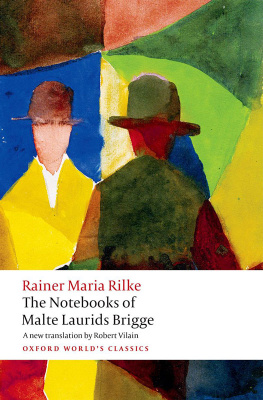
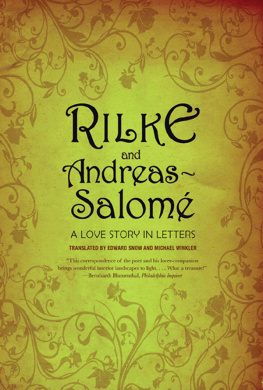
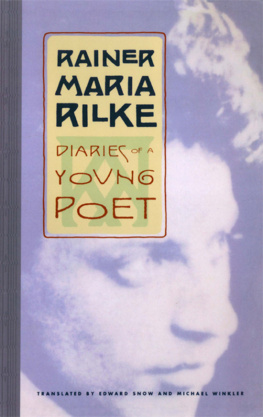

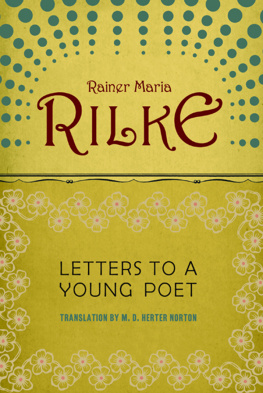
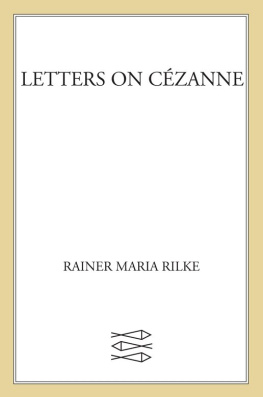
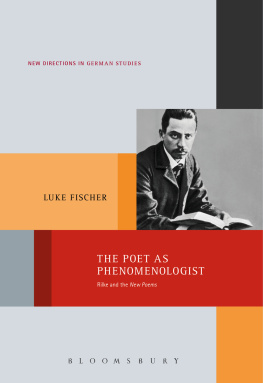
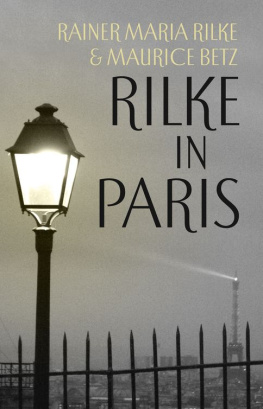
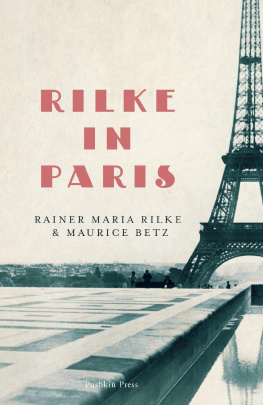
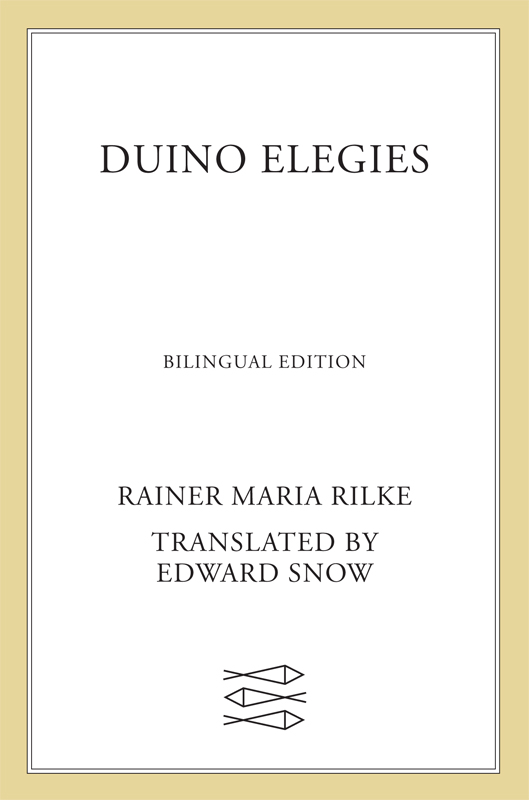
 The author and publisher have provided this e-book to you for your personal use only. You may not make this e-book publicly available in any way. Copyright infringement is against the law. If you believe the copy of this e-book you are reading infringes on the authors copyright, please notify the publisher at: us.macmillanusa.com/piracy. Contents PREFACE The Duino Elegies take their name from Castle Duino, an ancient fortress-like structure set high atop cliffs overlooking the Adriatic near Trieste. It was once a Roman watchtower, and Dante supposedly wrote parts of The Divine Comedy there.
The author and publisher have provided this e-book to you for your personal use only. You may not make this e-book publicly available in any way. Copyright infringement is against the law. If you believe the copy of this e-book you are reading infringes on the authors copyright, please notify the publisher at: us.macmillanusa.com/piracy. Contents PREFACE The Duino Elegies take their name from Castle Duino, an ancient fortress-like structure set high atop cliffs overlooking the Adriatic near Trieste. It was once a Roman watchtower, and Dante supposedly wrote parts of The Divine Comedy there.